| Official Name | Republic of Argentina |
| Official Language: | Spanish |
| Area: | 2,780,400 km2 (1,073,500 sq mi) |
| Population: | 44,900,000 |
| Time Zone: | UTC−3 |
| Capital City: | Buenos Aires |
| Height (Buenos Aires): | 25 m (82 ft) |
| Currency: | Argentinean Peso (ARG) |
| Main Cities: | Buenos Aires, Córdoba, La Plata, Rosario |
| Main Port: | Port of Buenos Aires |
| Required visa for entry: | Nationals from Australia, Canada, EU countries, and the UK and others DO NOT require visas. Click here for more information concerning visa requirements. |
| Required vaccination for entry: | None |
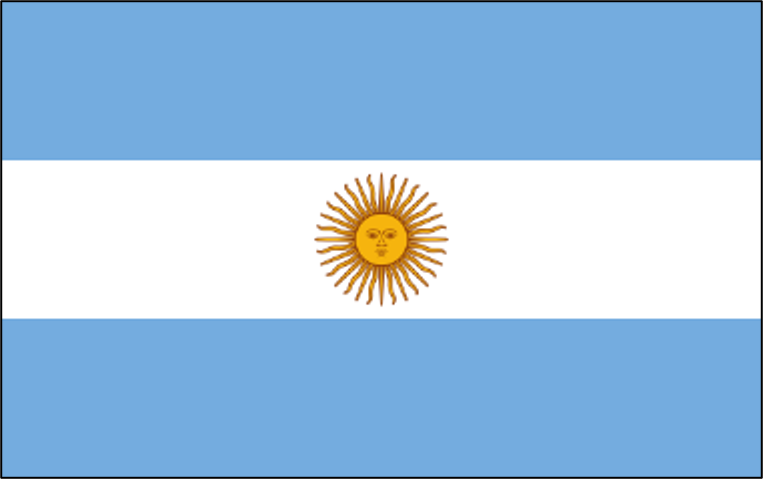
Main Risks:
Theft, robbery, rape, fraud, vehicle assault, unruly demonstrations.
Executive Summary
Argentina features low risks. The main threat is the risk of suffering armed and unarmed robbery at the hands of common criminals. Security risks increase if itineraries involve travel to the Buenos Aires greater metropolitian area (locally known as “conurbano”). We further advise against travel to the city of Rosario without secure transportation. In these sites risks stemming from crime is higher. In Buenos Aires and other cities, protests are recurrent, especially against the backdrop of an ongoing economic crisis. As a rule of thumb, we recommend avoiding the vicinity of any given demonstration. Even peaceful ones can rapidly devolve into violence with little or no warning. In case of high-profile travel, we recommend hiring secure transportation or executive protection services.
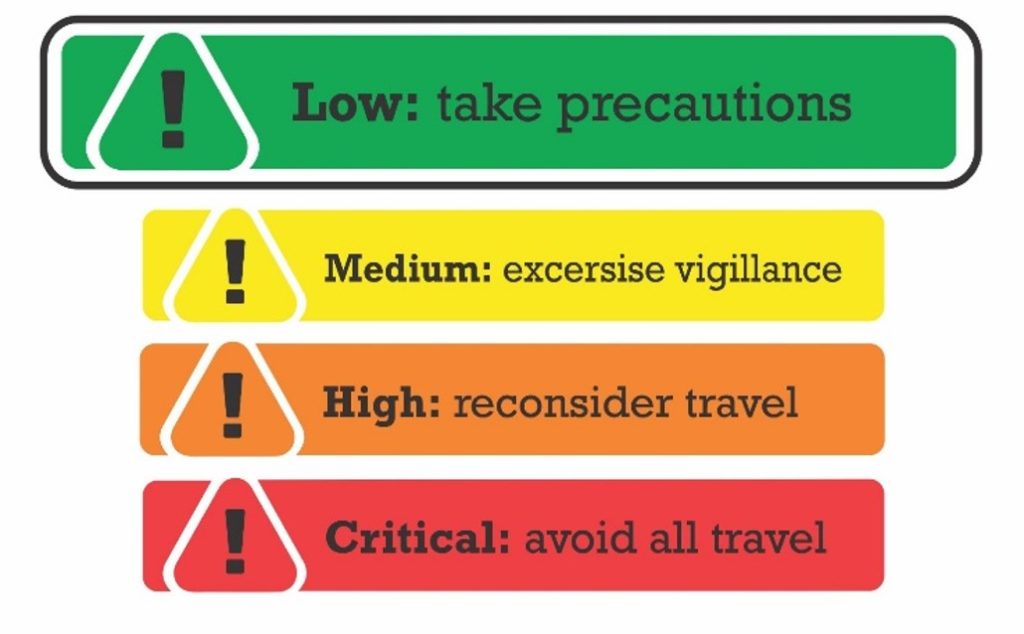
General Risk Level: LOW.
The risk generally remains stable throughout the country. That said, we advise against traveling to low-income residential areas in the Buenos Aires extended metropolitan area and the city of Rosario.
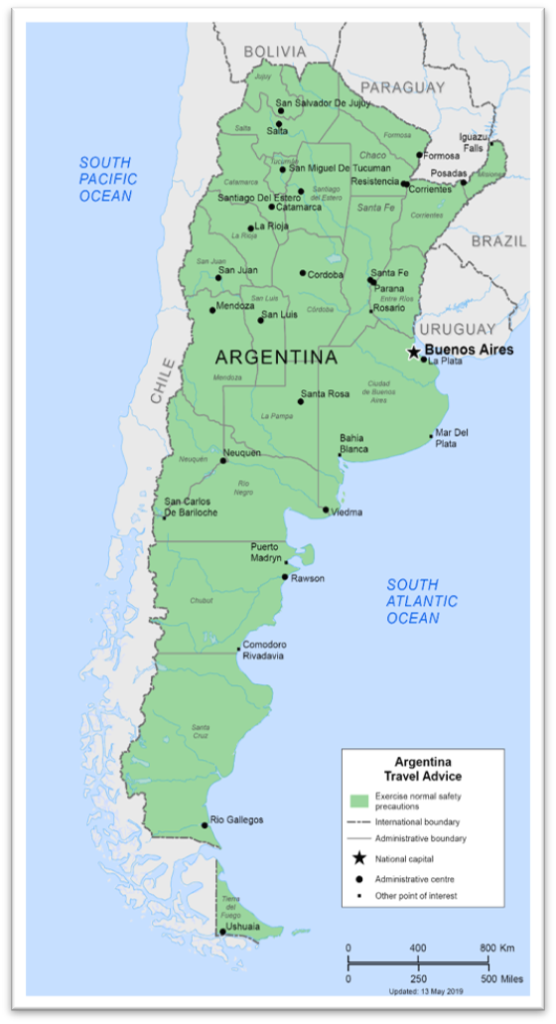
Crime and Security
Similar to what transpires in other Latin American countries, low and medium-level crime represents the main threat to travelers visiting Argentina. The risk of suffering robbery is higher in low and medium residential areas in the Buenos Aires metropolitan area. That said, violent episodes are still liable to occur in any given urban area. Unlike other countries in the region, there is not a significant risk of kidnapping.
Although Argentina has no critical problems concerning organized crime, in recent years the country has become a transit thoroughfare for drugs. Given this situation, there are clashes between rival gangs fighting for influence and territory. As a result, security has worsened in the city of Rosario, in the Santa Fe province, and in some low and middle-income areas surrounding Buenos Aires.
On another note, militant Mapuche indigenous groups operate in the Patagonian provinces of Rio Negro, Chubut, Neuquén, and Santa Cruz. While their membership is small, militants seek to disassociate their communities from the Argentinean state. These groups pose a threat to oil and foreign private interests in the region. Tourists and visitors are not targeted. Political rallies and demonstrations transpire almost on a day-to-day basis in Argentinean cities, especially in Buenos Aires. Protests organized by left-leaning elements usually turn unruly, as activists often resort to vandalizing private and private property. Moreover, activists are known to resort to roadblocks, locally known as “piquetes” and thus cause traffic disruptions. Sometimes violent activists detonate small improvised explosive devices (IEDs). Authorities are generally reluctant to order security forces to disperse demonstrators out of fear of exacerbating violence. For this reason, notwithstanding an uptick in unruly protests, recent times have rarely witnessed heavy clashes between police and demonstrators. In any case, given that activists are prone to be violent, we advise avoiding the vicinity of any unfolding protest.
Security in Buenos Aires
The safest neighborhoods are located along the shoreline with the River Plate (Río de la Plata). Recommended areas for lodging, travel, and conducting business and transactions are Puerto Madero, Retiro, Palermo (Nuevo/New and Viejo/Old), and Belgrano. The central business district is in San Nicolás, better known as the “center” (centro). While deemed a safe area, take note that traffic disruptions and protests are commonplace. These neighborhoods are perceptibly safer than others because they are better protected by security forces and private security agents. Puerto Madero is particularly noted for featuring high-profile hotels and residential towers. The area is monitored by the National Gendarmery.
Many criminals operate on motorbikes to assault distracted passersby and promptly flee the scene. Except for Puerto Madero, these incidents can occur in the city center and relatively safe neighborhoods. That said, the situation in Buenos Aires has improvided in recent years following the creation of a city police department and the mounting of CCTV cameras along the main intersections and thoroughfares.
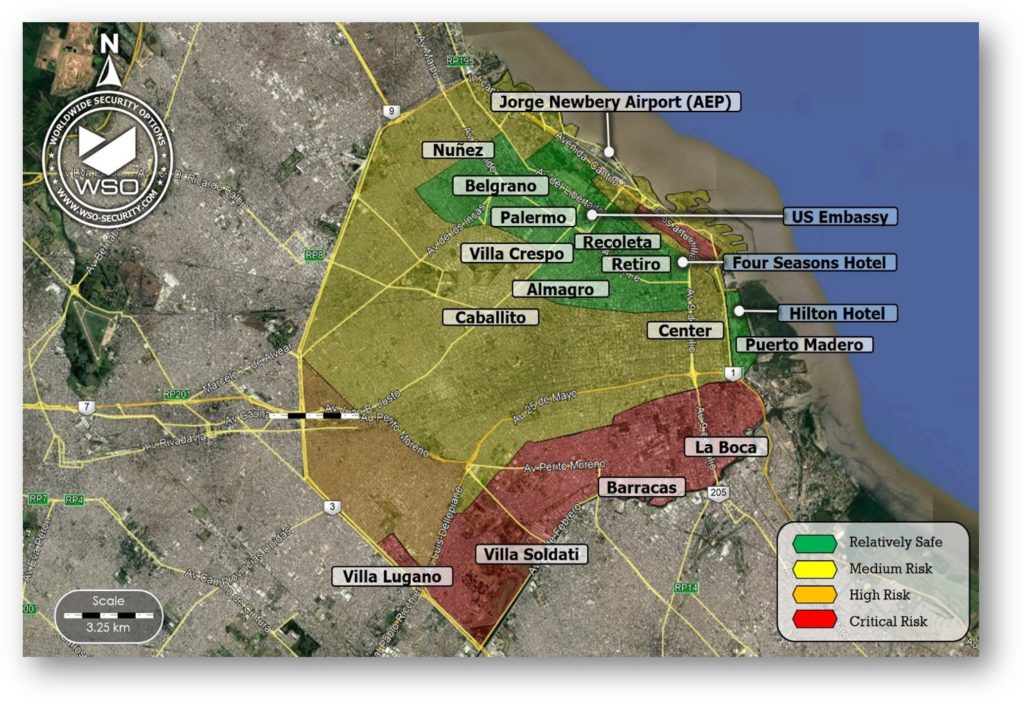
Areas in southern parts of the city, generally inhabited by low-middle classes should be avoided due to security concerns. This is especially the case concerning La Boca, a neighborhood frequented by tourists. Despite being of great cultural value, criminals extensively operate in the area. These assault locals and foreigners alike and seek to take advantage of the carelessness of tourists. In 2017 a US national was stabbed by criminals in La Boca. At any rate, we advise exercising heightened vigilance in areas vulnerable to crime.
Buenos Aires has three airports. The Ministro Pistarini International Airport, better known as Ezeiza (EZE), is the main entry point into the country. The airport is located southwest of the capital, about 40 kilometers from the center. Travel between EZE and the city center should take about 60 minutes depending on traffic. The Jorge Newbery Airport (AEP), better known as “Aeroparque”, is located in the shoreline area (locally known as “Costanera”). It is about 30 minutes away from the city center depending on traffic. Although it serves international routes, most flights departing from AEP are domestic. In turn, the El Palomar Airport (AEP), west of the capital, is used by low-cost carriers to connect domestic routes. The trip between the city and AEP usually takes about 60 minutes.
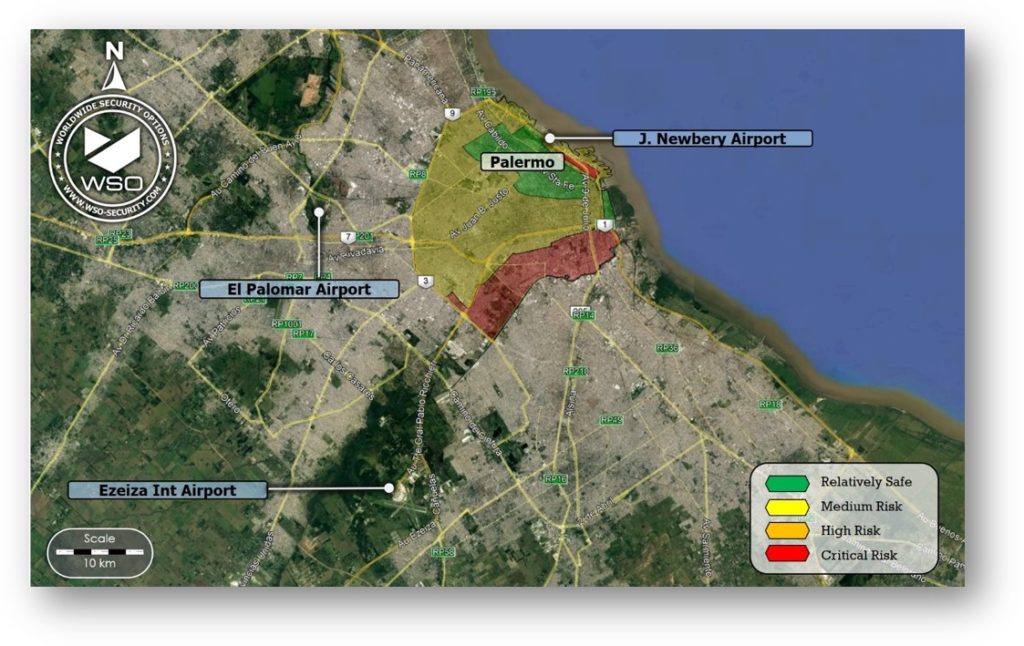
Transportation
Buenos Aires has two international airports. The Ministro Pistarini located in Ezeiza (EZE) is the main entry point into the country and is located about 60 minutes southwest of the capital depending on traffic conditions. The Jorge Newbery Airport (AEP) is located in the shoreline area (locally known as “Costanera”) and is about 30 minutes away from the city center. Although it serves international routes, most flights departing from AEP are domestic.
For security reasons, we do not recommend using public transportation services in Buenos Aire, especially while carrying important documents or valuables. It is recommended to procure reputable private transportation services in advance. It is feasible to use taxis recommended by the main hotels. In any case, please be advised that some taxi drivers might attempt to take advantage of foreign passengers to inflate the price of the trip. In the event of high-profile visits, it is best to procure private protection services.
Note that in Argentina ridding share applications are legally banned. Although they continue to operate extra officially, drivers often ask passengers for payment in cash. Moreover, in recent times there have been violent episodes involving conventional taxi drivers and self-employed ones. For these reasons, in Argentina, it is best to avoid these applications. The best option to travel between cities in Argentina is to take commercial flights. Although land routes are in good condition, due to long distances it is best to avoid traveling by car.
Health and Sanitary Conditions
While no proof of vaccination is required for entry into the country, it is recommended to have the following vaccines before traveling: yellow fever, tetanus, hepatitis A and B, and typhoid. In summer, due to high temperatures, it is necessary to wear protection against bugs, especially in the Entre Ríos, Santa Fe, San Juan, Corrientes, and Misiones provinces. In these regions, it is best to avoid leaving body areas uncovered to mitigate the risk of suffering mosquito-borne diseases such as dengue, the Chagas disease, and the zika virus. The quality of tap water in Argentina is relatively high. It is not advised to travel without international health insurance covering emergency medical evacuation to the country of origin.
Take essential health precautions to mitigate the risk of contracting diseases or viruses. Carry masks in crowded places such as airports and maintain rules of social distance and avoid contact with surfaces of common use in public places. Always carry hand sanitizer.
Tactical Recommendations
Exercise vigilance and situational awareness throughout the duration of the trip to Argentina, especially in urban areas vulnerable to low and medium-level criminal activity. If possible, avoid traveling to the city of Rosario without secure transportation services. In Buenos Aires, avoid non-essential travel to risk areas, especially in southern parts of the city. Avoid venturing into peripheric areas within Buenos Aires’ extended metropolitan area (the “conurbano”).
We recommend hiring private transportation and executive protection services for high-profile trips, especially if travel through the countryside is required.
Avoid carrying large sums of cash or valuables during the trip. We advise against wearing or carrying items in public that may give the impression of economic affluence and which could attract unwanted attention from criminals.
Avoid traveling through the country in sport or luxurious cars which could attract unwarranted attention from criminals and corrupt police officers.
Do not resist armed robbery attempts. We recommend to always carry a few 20 USD bills or 500 ARG bills for duress cases, specifically to appease criminals looking for easy money.
We recommend lodging in reputable establishments and hotels with private security. In Buenos Aires, it is best to stay in Puerto Madero, Recoleta, and Palermo.
If private transportation services are unavailable, resort to reputable radio taxi companies, provided they are recommended by the best hotels. Stay alert at all times while traveling by taxi to prevent the driver from taking unnecessary detours or from inflating the fare.
Avoid the vicinity of every kind of political demonstration or rally in urban areas. Peaceful demonstrations are liable to be infiltrated by violent elements. Take all necessary precautions to mitigate the risk posed by mosquito-borne diseases, especially during summer and in the northeastern parts of the country, where the climate is more humid.
Emergency Contacts
Police: 911
Ambulance: 911
Fire: 911
WSO Global Command Center: +1 956 467 4858 / gcc@wso-security.com
Security advice and assistance over WhatsApp: +593 99 461 1128 / +521 81 1511 3166







